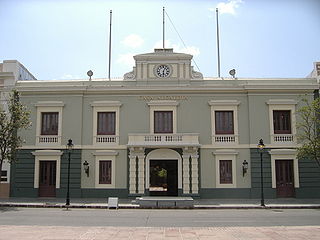
Trouw is a Dutch daily newspaper appearing in compact size. It was founded in 1943 as an orthodox Protestant underground newspaper during World War II. Since 2009, it is owned by De Persgroep. Trouw received the European Newspaper Award in 2012. Cees van der Laan is the current editor-in-chief.

The Netherlands Antilles national football team was the national team of the former Netherlands Antilles and was controlled by the Nederlands Antilliaanse Voetbal Unie. The NAVU consisted of Curaçao and Bonaire. Aruba split in 1986 and has its own team.
Same-sex marriages are not performed in Aruba, Curaçao, or Sint Maarten, which are constituent countries of the Kingdom of the Netherlands. The islands were, however, obliged after several court rulings to register any marriage registered in the Kingdom, but they don't have to give same-sex marriages the same legal effect as opposite-sex marriages. As marriage in the European territory of the Netherlands, as well as in the Caribbean Netherlands is open to any two people, marriages performed there have to be registered in the islands.

The Netherlands Antillean guilder is the currency of Curaçao and Sint Maarten, which until 2010 formed the Netherlands Antilles along with Bonaire, Saba, and Sint Eustatius. It is subdivided into 100 cents. The guilder was replaced by the United States dollar on 1 January 2011 on Bonaire, Saba and Sint Eustatius. On Curaçao and Sint Maarten, the Netherlands Antillean guilder was proposed to be replaced by a new currency, the Caribbean guilder, but this has been stalled indefinitely by negotiations over the establishment of a separate central bank for Curaçao.
General elections in the Netherlands Antilles took place on 22 January 2010. Voters elected the 22 members of the Estates, or parliament, of the Netherlands Antilles. It has been the country's last general election, as the Netherlands Antilles have ceased to exist as a country within the Kingdom of the Netherlands on 10 October 2010. At the time of the elections, the Netherlands Antilles consisted of the Caribbean islands of Bonaire, Curaçao, Saba, Sint Eustatius and Sint Maarten.

The Caribbean Netherlands are the three special municipalities of the Netherlands that are located in the Caribbean Sea. They consist of the islands of Bonaire, Sint Eustatius and Saba, although the term "Caribbean Netherlands" is sometimes used to refer to all of the islands in the Dutch Caribbean. In legislation, the three islands are also known as the BES islands. The islands are currently classified as public bodies in the Netherlands and as overseas countries and territories of the European Union; thus, EU law does not automatically apply.

A status referendum was held on the island of Sint Maarten on 22 June 2000.
A status referendum was held on the island of Bonaire on 10 September 2004. A majority voted for integration into the Netherlands.
A status referendum was held on the island of Saba on 5 November 2004.

The Dutch Caribbean are the territories, colonies, and countries, both former and current, of the Dutch Empire and the Kingdom of the Netherlands that are located in the Lesser Antilles archipelago of the Caribbean Sea.
An island council was the governing body of an island territory, an administrative level of the Netherlands Antilles until its dissolution.
This article lists some of the events that took place in the Netherlands in 2010.

Dominico Felipe "Don" Martina is a Curaçaoan politician. He served two terms as Prime Minister of the Netherlands Antilles. His first term lasted from November 1979 to October 1984 and his second term from January 1986 to July 1988.
Jaime Mercelino Saleh is a Dutch Antillean politician and former judge. He was a judge on the Joint Court of Justice of the Netherlands Antilles from 1974 to 1990 and was its president from 1979. Saleh subsequently served as Governor of the Netherlands Antilles between 1990 and 2002.

The First de Jongh-Elhage cabinet was the 26th cabinet of the Netherlands Antilles.
General elections in the Netherlands Antilles took place on 18 January 2002.










